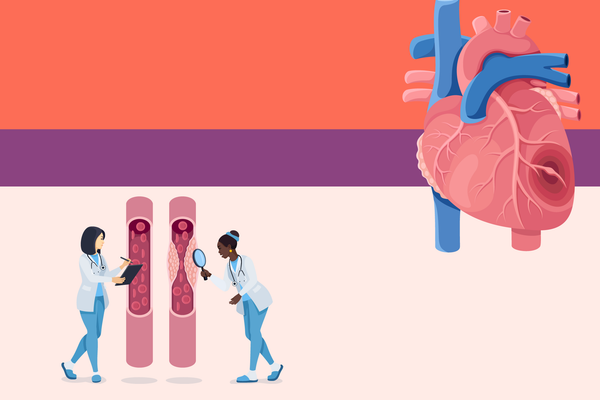Heart disease goes up as we age and especially after menopause. One in three female adults has some form of cardiovascular disease, according to the American Heart Association.
What's up with that?
For one thing, aging causes changes in your heart and blood vessels. For another, menopause brings other changes—like the loss of estrogen. Estrogen is thought to be heart-protective .
But it's important to note: Menopause itself does not cause heart disease.
But I always thought menopause and the ensuing loss of estrogen were the main culprits in developing heart disease. You mean that's not true?
Many experts say estrogen loss during menopause "may" play a role. But aside from the estrogen connection, menopause causes changes in your body that can make you more susceptible more to heart disease.
Like what kinds of changes?
All things that naturally make your risk of heart disease rise, like:
- LDL cholesterol. The "bad" kind (low-density lipoprotein) rises, while the "good" cholesterol (high-density lipoprotein) declines or stays the same.
- Blood pressure goes up.
- Triglycerides—a type of fat in your blood—rises.
- Belly fat/weight increases.
Scary. I want to protect my heart, of course. What numbers do I need to know to assess my risk of heart disease?
- Blood Pressure. Shoot for 120/80 mm Hg. High blood pressure is referred to as the "silent killer," because there are no symptoms. Uncontrolled, it's a major risk for heart disease and increases your risk of developing heart disease by 25 percent.
- Body Mass Index. This number, also known as BMI, is calculated from your height and weight and should be around 25/kg/m2. BMI is a screening tool that helps determine body fat and can tell if you're overweight or obese (which increases your risk for heart disease). If your BMI is between 18.5 and 24.9, you're classified at a "normal" weight. Anything above that is considered overweight or obese. Keep in mind, though, that BMI measurements may have some limitations and may underestimate or overestimate your body fat. Learn more about estrogen and weight gain.
- Waist Circumference. Women should shoot for a waist circumference of less than 35 inches. This may be a better tool than BMI for measuring body fat, say some experts. Carrying weight around your middle is known as visceral fat (also known as "active" fat), and it lies deep within the abdominal cavity near your organs. The fat you carry in your hips and thighs, known as subcutaneous fat, is less problematic and poses a lower risk to your heart. Here's some info to help you know how to measure properly.
- Blood Glucose Level. Aim for a number of less than 100. This is an important number, because having diabetes puts you at a fivefold greater risk for heart disease. That's partly because it can damage the blood vessels and nerves that control your heart. A fasting blood glucose test is the most common way it's measured.
- Total Cholesterol. An ideal score, which includes a total of your LDL, HDL and 20 percent of your triglyceride score, is 200 or less. Since LDL is responsible for clogging your arteries, that's the number most health care professionals will focus on lowering if it's too high (a reading of 130 to 159 mg/dL is borderline high).
- Resting Heart Rate. This is how many times your heart beats per minute when you're at rest. A lower rate is associated with a lower risk of death because it's usually a sign of your cardiovascular fitness. For most people, a rate between 60 and 100 beats per minute is considered in the normal range.
And speaking of a healthy heart, a little self-care goes a long way:
- If you smoke, quit!
- Get regular exercise. More about how much you actually need.
- Limit alcohol.
- Manage stress.
- Get adequate sleep. Most adults need between seven and nine hours.
- your weight at a healthy level.
- Focus on healthy foods. Limit saturated fats and foods high in sodium and sugar. The DASH diet is the poster child for a heart-healthy way of eating.
And lastly, make sure you get regular annual preventive screenings, and make your health care professional aware of any family history or recent health changes.
- Improve Your Heart Health After Menopause ›
- Atherosclerosis ›
- The Connection Between Diabetes, Cardiovascular Disease and Women's Health ›
- Clinically Speaking: Questions to Ask Your Healthcare Provider About Diabetes and Cardiovascular Disease ›
- Heart Disease ›
- My Heart Attack at 43 Was Terrifying. Then It Changed My Life for the Better. - HealthyWomen ›





